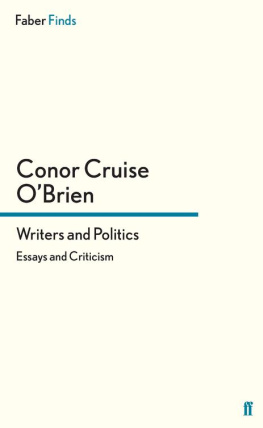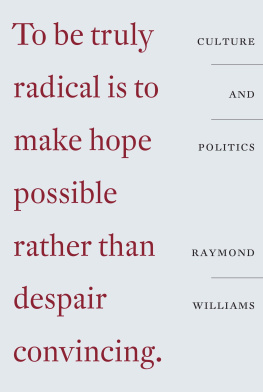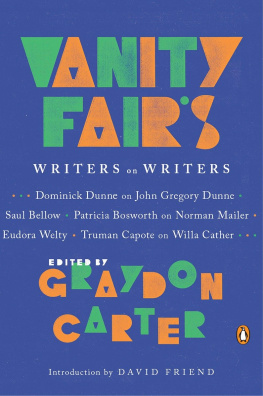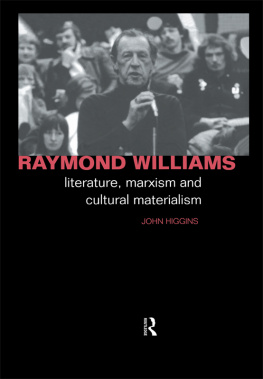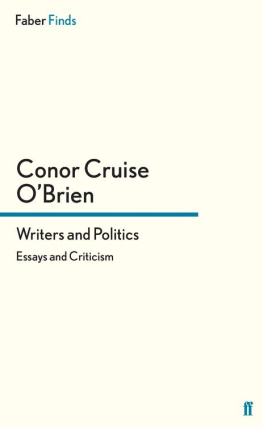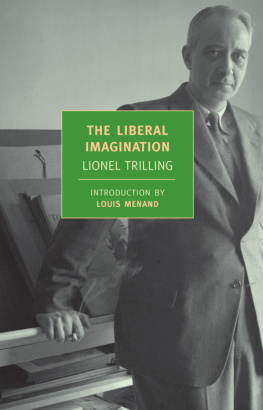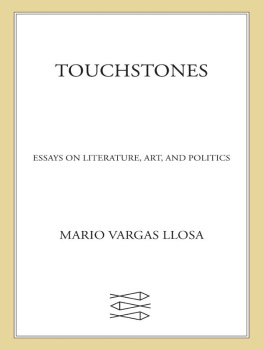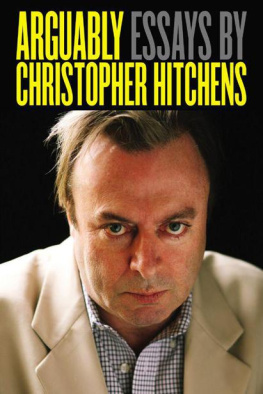by Oliver Kamm
The last time literally the last time, when he had an advanced stage of cancer I visited Christopher Hitchens, we talked about the books and writers that had influenced him. He told how, in 1967, he picked up a volume of essays called Writers and Politics by Conor Cruise OBrien in a public library in Tavistock, Devon. Reading it, he formed the ambition to be able to write like that.
I had a similar experience. I never met OBrien but he was one of the earliest and most important influences on my political thinking and my wish to be a writer. As an undergraduate at Oxford, I picked up one of his books in the Bodleian Social Science Library. It was a collection of essays and reviews called Herod: Reflections on Political Violence (1978). His arguments throughout the book were a different face of OBriens politics (though he would certainly have claimed they were the same politics in essence) from his volume of the 1960s. In condemning Americas war in Vietnam, he was recognisably a writer of the anti-imperialist Left. In his later volume, encapsulating his experience as a cabinet minister in Irelands coalition government in the mid-1970s, he wrote of the destructiveness of absolutism.
Its a great book. In it, OBrien not only denounces IRA terrorism, as you would expect from a mainstream politician, but in a sense quite different from the rationalisations offered by ideological apologists for political violence seeks to understand it. I mean, really understand it not extenuate it by equivocation and non sequitur. And his thinking leads him to attack the republican mythology at the heart of the Irish state. Few writers have analysed terrorism so acutely or been as effective in undermining its ideological justifications. Here is how OBrien recounts his thinking:
In the politics of the Republic, I was not quite where I was expected to be. In the Congo time, sections of the British press had assured their readers (quite wrongly) that I was motivated by anti-British fanaticism. My career in America had shown me as opposed to imperialism. So I was expected at least to fall into line with the view that the troubles in Northern Ireland were caused by British imperialism. When instead I said that, in relation to Northern Ireland, it was the IRA who were the imperialists, since they were trying to annex by force a territory a large majority of whose inhabitants were opposed to them, my remarks appeared either incomprehensible or outrageous to a number of people who had liked what they heard about me much more than they like what they were hearing from me.
As a prophet, OBrien was fallible. He doubted that the Irish constitution, with its irredentist claims to the whole island of Ireland, could be reformed in order to excise those articles. Yet eventually it was, and politics in Northern Ireland became marginally more normal (or at least less sectarian and violent). What was significant, even brilliant, about OBriens analysis was its lucidity in exposing cant. He realised that it was an untenable position for democratic politics both to condemn terrorism and to rely on a romanticised view of how the state had come into being and won its independence. OBrien was repelled by the cult of the blood sacrifice (expressed most eloquently but chillingly by Yeats in his one-act play Cathleen ni Houlihan) which underlay republican thinking. Being OBrien, he didnt hold back in saying so. It took courage raw physical courage, and not only political heterodoxy to say such things in Ireland in the 1970s.
OBrien had many roles in his long and eminent life. He was diplomat, statesman, politician, historian, literary critic, journalist and polymath. But most of all, he was a public intellectual in the best sense of the term. He applied his knowledge and critical intelligence to matters of great public interest, and he expressed his thinking in elegant, spare prose that argued a case with remorseless logic. He was a great man and a great Irishman, and Faber are to be congratulated in reissuing his work.
OBriens written output is best represented by his historical studies. Three of those volumes stand out in my estimation. First, States of Ireland (1972) remains the finest historical account of how the Troubles in Ireland erupted. It was a seminal revisionist treatment of the myths of Irish republicanism. If, as many of his admirers (including me) thought, OBrien eventually went too far in embracing the cause of unionism and underestimated the capacity of a constitutional nationalism to reform itself, he did so with an unflinching humane intelligence.
OBriens history of the Zionist movement and Israel, The Siege (1986), is also a fine work of scholarship whose analysis stands up well in the light of later events. OBrien was a friend to and admirer of Israel and often a lonely voice in media circles in explaining the Jewish states security dilemmas. His downbeat but realistic conclusion was that Israel could not be other than it is, a Jewish state, which merited the sympathy of liberals in maintaining its democratic and secular character in spite of being in a state of permanent siege. Devoutly as he wished for a peaceful solution to the conflict in Palestine, OBrien believed that a solution was not available. On his analysis, conflicts dont have solutions: they have outcomes. I hope he is eventually proved wrong, and that a two-state solution between a sovereign Palestine and a safe Israel comes into being. But OBriens pessimism seems historically well-grounded.
Probably OBriens greatest achievement of historical scholarship is his biography of Edmund Burke, The Great Melody (1992). Burke is much cited by modern conservatives, and not necessarily accurately. The little platoons that they celebrate arent what Burke meant by the phrase; he was instead appealing to a notion of a fixed social order, in which each man knew his place. It is far removed from the modern ideals of social (and sexual) equality. Yet OBrien retrieved the idea of Burke as a Whig of unrivalled historical farsightedness. On OBriens telling, Burke foresaw the bloody degeneration of the French Revolution even while celebrating the potential of the American Revolution. Among the gems in the paperback edition of the book is his respectful and affectionate exchange with Isaiah Berlin. OBrien, as a confirmed Rousseau-basher, will have no quarter with any romantic idealisation of the general will.
OBriens was a tough-minded version of liberalism, which stressed the dangers of untrammelled reason. In that respect, he was a worthy inheritor of the tradition of Burke. In his late collection On the Eve of the Millennium (1995), he noted that the worst crimes of the twentieth century had been committed by forces that considered themselves thoroughly emancipated from superstition Nazism and Communism. OBrien was a man of the Enlightenment, who believed its greatest enemy was absolutism.
His contrarian streak sometimes led him to mistaken and even perverse positions: against European integration; against intervention to stop the aggressive designs of Slobodan Milosevic; opposition in principle, and not merely pragmatic objections, to the Good Friday Agreement in Northern Ireland; and most notably a deep hostility to the American civic religion that celebrates Thomas Jefferson. His book The Long Affair: Thomas Jefferson and the French Revolution (1996) depicts Americas third president as (and I dont exaggerate) an ideological precursor of Pol Pot.

